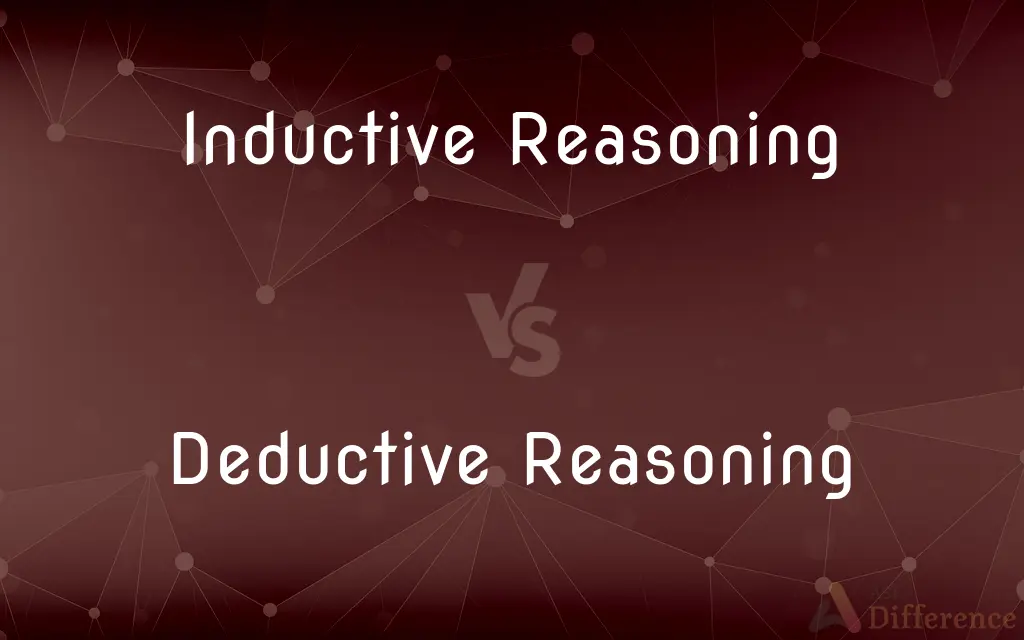Inductive Reasoning vs. Deductive Reasoning — What's the Difference?
By Tayyaba Rehman — Published on October 29, 2023
Inductive reasoning starts with observations and concludes with general principles; deductive reasoning starts with a premise and deduces specific conclusions.

Difference Between Inductive Reasoning and Deductive Reasoning
Table of Contents
ADVERTISEMENT
Key Differences
Inductive reasoning involves making generalizations based on specific observations. By contrast, deductive reasoning starts with a general principle and applies it to specific cases. Both forms of reasoning are essential in different contexts.
Inductive reasoning is often used in the discovery phase of scientific investigations. For example, one might observe a pattern among specific cases and then hypothesize a general rule that explains this pattern. Deductive reasoning, however, would take a known principle and then test it against specific instances to verify its applicability.
In the realm of mathematics, deductive reasoning is common. Once a theorem is established, mathematicians can deduce numerous conclusions from it. Inductive reasoning, on the other hand, might be used in more exploratory phases or in contexts where patterns emerge from specific data points.
It is important to note that inductive reasoning can lead to conclusions that are probably true, but not certain. Deductive reasoning, when correctly applied, leads to certain conclusions given that the premises are true. Both inductive and deductive reasoning are critical for various fields, from scientific research to legal analysis.
Comparison Chart
Basis of Reasoning
Specific observations
General principles
ADVERTISEMENT
Result Certainty
Probable conclusions
Certain conclusions (if premises are true)
Common Use
Scientific discovery
Mathematical proofs
Starting Point
Begins with data or specific instances
Begins with an accepted generalization or theory
Nature of Conclusion
Generalizations
Specific outcomes
Compare with Definitions
Inductive Reasoning
Inductive reasoning identifies patterns and trends from particular observations.
All the fruits from this tree have been sweet; thus, the tree likely only produces sweet fruits.
Deductive Reasoning
Deductive reasoning confirms specifics based on an accepted theory.
Triangles have three sides; figure X is a triangle; therefore, figure X has three sides.
Inductive Reasoning
Inductive reasoning hypothesizes based on observations.
The sun has risen every day I've been alive; it might always rise.
Deductive Reasoning
Deductive reasoning proceeds from theory to observation.
If it rains, the ground gets wet; it rained; the ground is wet.
Inductive Reasoning
Inductive reasoning infers universal truths from limited observations.
Every time I've dropped a ball, it fell downwards; gravity might apply universally.
Deductive Reasoning
Deductive reasoning derives certain outcomes given true premises.
All mammals have a spine; a dog is a mammal; so, a dog has a spine.
Inductive Reasoning
Inductive reasoning generalizes based on a subset of data.
Every student in the class passed the test; the class might be advanced.
Deductive Reasoning
Deductive reasoning applies general rules to particular instances.
All birds have feathers; a robin is a bird; hence, a robin has feathers.
Inductive Reasoning
Inductive reasoning draws general conclusions from specific instances.
All observed swans are white; therefore, all swans might be white.
Deductive Reasoning
Deductive reasoning draws specific conclusions from general principles.
All men are mortal; Socrates is a man; thus, Socrates is mortal.
Common Curiosities
How does inductive reasoning differ from making a guess?
Inductive reasoning is based on observations and patterns, while a guess might not have such a foundation.
What is the basis of inductive reasoning?
Inductive reasoning is based on specific observations.
What's a common use for deductive reasoning?
Mathematical proofs often employ deductive reasoning.
How does deductive reasoning work?
Deductive reasoning starts with a general principle and deduces specific conclusions.
Can inductive reasoning provide 100% certainty?
No, inductive reasoning offers probable conclusions, not absolute certainty.
Is deductive reasoning always accurate?
If the premises are true and reasoning is correct, deductive reasoning will be accurate.
Which is more common in scientific research, inductive or deductive reasoning?
Both are used, but inductive reasoning is often employed in the discovery phase.
Can deductive reasoning lead to incorrect conclusions?
Yes, if the initial premises are false or if the reasoning is flawed.
What's an example of inductive reasoning in daily life?
Observing that traffic is usually heavy at 5 pm and thus leaving earlier to avoid it.
Which type of reasoning is more prone to errors?
Inductive reasoning, as it's based on probable conclusions rather than certainties.
Can inductive reasoning be used in mathematics?
Yes, though it's more common in exploratory phases or when identifying patterns in data.
Why is deductive reasoning important in logic?
Deductive reasoning ensures conclusions are certain given true premises, making it foundational in logical arguments.
Is it possible for both inductive and deductive reasoning to be used together?
Yes, both can be employed in a complementary manner in various contexts.
Which type of reasoning starts with a theory?
Deductive reasoning.
Can deductive reasoning be used in everyday situations?
Yes, e.g., "If it's raining, I'll need an umbrella. It's raining, so I'll take my umbrella."
Share Your Discovery

Previous Comparison
Stereotyping vs. Labeling
Next Comparison
Fixed Charge vs. Floating ChargeAuthor Spotlight
Written by
Tayyaba RehmanTayyaba Rehman is a distinguished writer, currently serving as a primary contributor to askdifference.com. As a researcher in semantics and etymology, Tayyaba's passion for the complexity of languages and their distinctions has found a perfect home on the platform. Tayyaba delves into the intricacies of language, distinguishing between commonly confused words and phrases, thereby providing clarity for readers worldwide.
















































